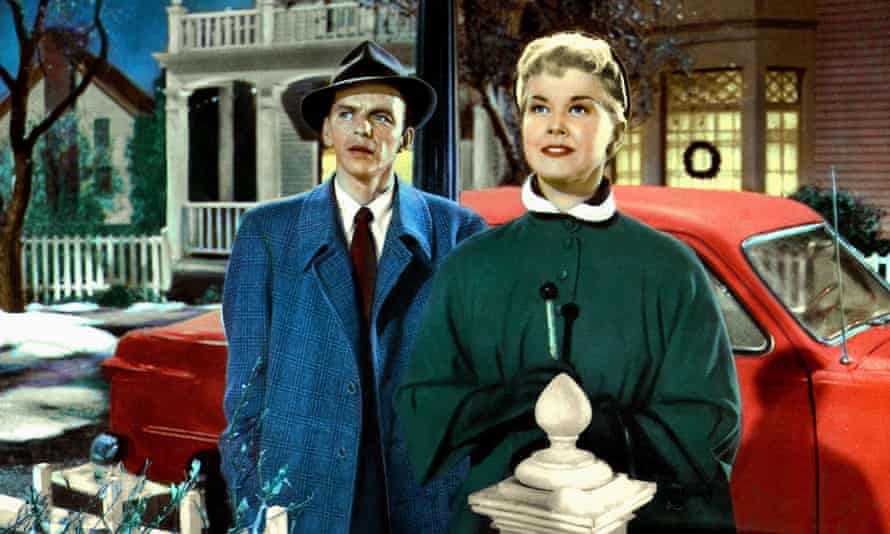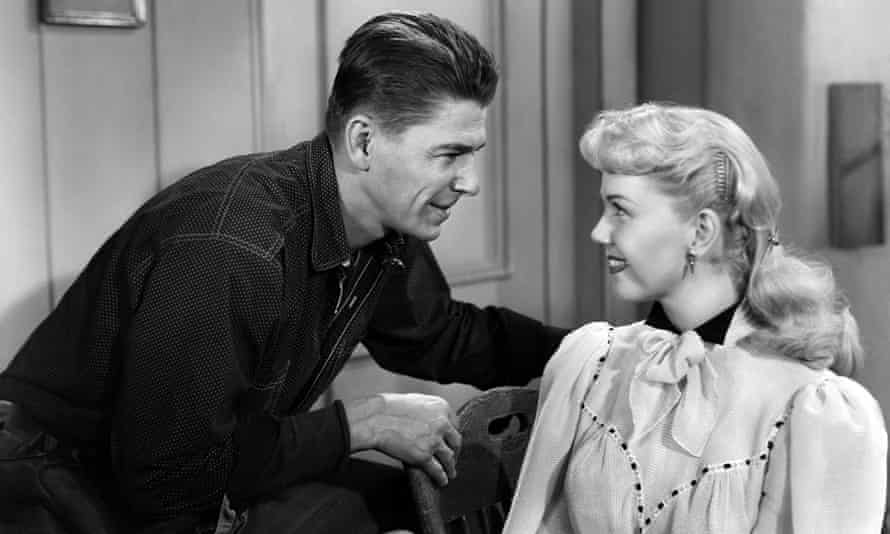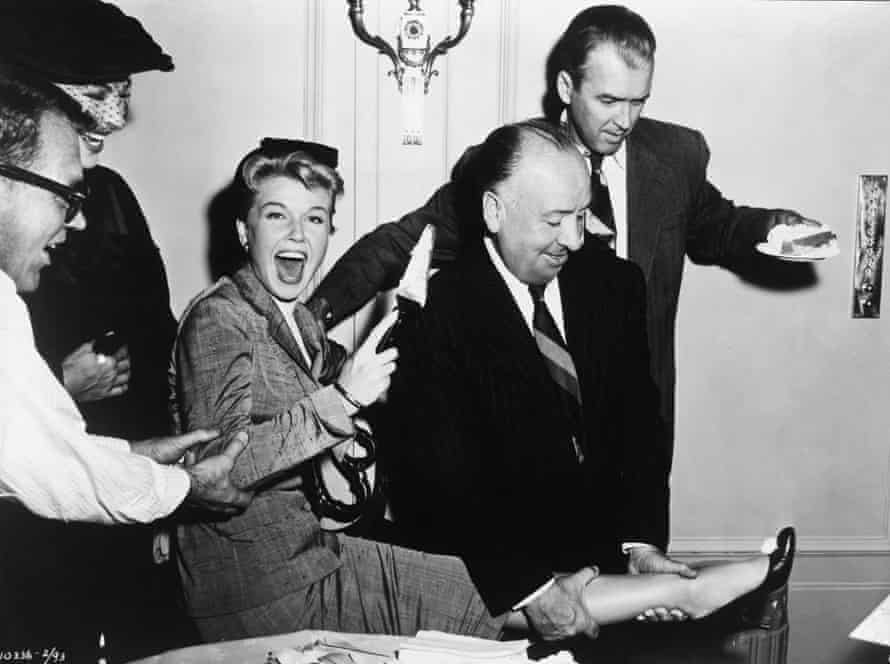Doris Day Again Other Recordings of This Song
Doris Solar day, who has died aged 97, was a singer who came out of the big-band blast of the 1940s to become one of Hollywood's top box-part stars throughout the 50s and 60s. She had a beloved vocalization, short, buttercup-coloured hair, a sunny grinning – and as many scruples equally freckles. If Marilyn Monroe was the "daughter downtown" at 20th Century Fox, Day was the archetypal "daughter adjacent door" at Warners.
Day was first seen as a spunky just naive showgirl in more than a dozen candyfloss Warner Bros musicals between 1948 and 1955. Then, from 1959 until her retirement from the big screen in 1968, she became a sophisticated urban adult female defending her honour and independence in a series of sleeky, sexual activity-boxing romantic comedies for Universal Studios.
During this crowning menses of her pic career, she showed a existent flair for one-act. Wearing dotty hats and stylish Jean Louis gowns, she played a serial of women determined not to cede their independence for the sake of a man or, at least, without a fight. This was all-time displayed in the 3 entertaining romantic comedies she made reverse Rock Hudson: Pillow Talk (1959), which earned her an Oscar nomination every bit best extra, Lover Come Back (1961) and Send Me No Flowers (1964), in which the pair were rivals-cum-lovers, she a decent working girl, he an amorous rogue. At one stage in Lover Come Back, someone compares Hudson to a bad cold. Day replies: "There are 2 means to handle a cold. You tin can fight information technology or you can give in and become to bed with information technology."
Day played variations of the same character in That Touch of Mink (1962), with Cary Grant; Move Over, Darling and The Thrill of It All (both 1963), with James Garner; and Do Not Disturb (1965) and The Drinking glass Bottom Gunkhole (1966), with Rod Taylor, simply none of these afterward leading men provided the chemistry she had had with Hudson.
Of her film persona in the 60s, the critics Jane Clarke and Diana Simmonds wrote that 24-hour interval "confronts the male person and forces him to change his attitudes and behaviour. Moreover, maxim no to manipulative sexual situations is not the same every bit clinging to one's virginity."
Day might have lived a charmed existence in many of her movies, just her life was not all sunshine and roses. She was born in Cincinnati, Ohio, of High german ancestry and when she was 8 years sometime, her parents – William Kappelhoff, a music teacher, and Alma (nee Welz) – dissever upwardly. When Doris was fifteen, her promising career as a dancer was halted by a machine accident. She had a lengthy recovery, during which her female parent encouraged her to start singing later on hearing her girl joining in with singers including Ella Fitzgerald on the radio. "There was a quality to Ella'south vocalization that fascinated me, and I'd sing along with her, trying to catch the subtle ways she shaded her voice, the casual notwithstanding clean way she sang the words," Day recalled.
She began a career as a vocalist with Barney Rapp'south band in 1939. It was Rapp who got her to change her proper name to Doris Day after hearing her sing Solar day After Day. Initially, she thought the name sounded "phoney", only she gradually accustomed that Kappelhoff was a piddling too long for the marquee outside the theatre.

While on the road with the band in 1941, anile 19, she married the trombonist Al Jorden, with whom she had a son, Terry. Jorden turned out to be a jealous married woman-beater. They divorced in 1943. At the same fourth dimension, Mean solar day was making an impression with Les Brown and His Band of Renown. In 1945, she had a hit with their recording of Sentimental Journey, which coincided with the end of the second globe war in Europe and became an unofficial homecoming theme for many veterans.
Subsequently a second unhappy matrimony, to the saxophonist George Weidler, ended in divorce in 1949, luck was on her side when Betty Hutton got pregnant merely before the shooting of Romance on the High Seas (1948) at Warners. Day was given top billing in her starting time characteristic by the film's producer-director, Michael Curtiz, subsequently she delivered an emotional version of George and Ira Gershwin'south Embraceable You at the audition. Impressed past her phonation and wholesome good looks, Curtiz signed her to a film contract, although she had never acted before.
Solar day's debut motion picture, which had her singing v songs, including the Oscar-nominated It'southward Magic (the flick'southward title in the Britain), was the first of a series of lightweight Warners musicals tailored for her, for which her singing was the raison d'être. Most of her numbers were performed in nightclubs or in stage shows; they seldom advanced the plot, although they sometimes reflected the country of heed of the innocent character she was playing.

The freshness and vitality of her singing and personality blew the cobwebs off the plots of My Dream Is Yours (1949), Tea for Two (1950), Lullaby of Broadway (1951), I'll See You lot in My Dreams (1951) and April in Paris (1952), all named afterwards the hit songs featured in the films. Far better were ii charming, small-town period idylls, co-starring the clean-cut, handsome baritone Gordon MacRae: On Moonlight Bay (1951) and By the Lite of the Argent Moon (1953). Her pairing with Frank Sinatra in Young at Middle (1954) was more than interesting as he was all scowls, she all smiles. It was a catamenia during which she was voted by servicemen in Korea as "the girl we would most like to accept a slow boat back to united states with".
Solar day likewise handled a few dramatic roles with ease. She was the long-suffering girlfriend of a trumpeter (Kirk Douglas) in Beau With a Horn (1950); Ginger Rogers'south sister in Storm Warning (1951), near a Ku Klux Klan murder; and wife of a baseball game player (Ronald Reagan) in The Winning Team (1952), in which she laid on her charm thickly to compensate for his lack of it. (She and Reagan became friends and political allies.)
In 1951, 24-hour interval married Marty Melcher, former talent scout and road manager of the Andrews Sisters. The couple formed a joint company, Arwin Productions, in 1952, which produced near of her films. The following year, Day gave ane of her gutsiest performances every bit the wild west heroine Cataclysm Jane, touchingly warbling the Oscar-winning striking song Hugger-mugger Dear while leaning against a tree, then on horseback and at the top of the colina at the height of her voice. Wearing buckskins and toting a gun, she only emerged at the finish from the chrysalis of tomboyhood into a butterfly of femininity in gild to charm her "surreptitious love", Wild Bill Hickok (Howard Keel).

In contrast, looking more glamorous than always, Twenty-four hours sang more than a dozen ballads (scored by Percy Faith) as the 20s torch vocalizer Ruth Etting in Love Me Or Exit Me (1955), her first motion-picture show for MGM. It was a musical worthy of her interim talents in which she matched James Cagney – as the abusive bootlegger gangster Moe "the Gimp" Snyder – blow-for-accident, line-for-line, drawing on her life experiences with men. The part was intended for Ava Gardner, merely Gardner refused to accept her singing dubbed. Etting, while obviously pleased with Twenty-four hours's performance, denied she had ever been a trip the light fantastic-hall hostess as portrayed in the motion picture, but acknowledged that it was a way of supplying context to the poignant song Ten Cents a Dance. After the moving-picture show was released, Twenty-four hour period was deluged with mail from fans attacking her, a Christian Scientist, for playing a woman who smoked, drank and wore scanty costumes.
Dorsum at Warners, Solar day appeared in one of her liveliest musicals, The Pajama Game (1957), adapted from the Broadway show by George Abbott and Stanley Donen. Once again revealing more spice than saccharide, she played "Baby" Williams, the dynamic head of the Union Grievance Committee of the Slumber-Tite Pajama Manufactory who falls for the foreman, despite belting out I'grand Not at All in Honey.
Day then had the "nerve-racking" experience of working for Alfred Hitchcock reverse James Stewart in The Man Who Knew Too Much (1956). "For each of my scenes there were dozens of takes, without Hitchcock maxim 1 word," Day remembered. "I said, 'Mr Hitchcock what am I doing incorrect?' 'If you weren't doing information technology correct, I'd tell you lot,' he said." Actually, all she had to do was look broken-hearted for most of the fourth dimension, and sing the Oscar-winning Que Sera, Sera (Whatever Will Be, Will Be) at a crucial moment in the film.
Solar day remained one of the top box-office stars, male or female person, in the US throughout the 60s. She was also one of the highest-paid. However, in her late films The Ballad of Josie (1967), Caprice (1967) and, finally, With Six You Get Eggroll (1968), she failed to find roles that suited her historic period. It seems a pity that she refused Mike Nichols's offer to play the seductive Mrs Robinson in The Graduate (1967), a plum role that went to Anne Bancroft. Day wrote: "I could not see myself rolling around in the sheets with a boyfriend half my age whom I'd seduced. I realised it was an effective part, only it offended my sense of values."
When Melcher died in 1968, it was revealed that he had squandered and embezzled most of Day'southward money. After recovering from a nervous breakdown, she reluctantly hosted the Doris Day Testify on TV for four years, a series that Melcher had contracted her to exercise without her knowledge. In 1974, she was awarded $22m in damages from the lawyer who had helped Melcher in the mismanagement of her business.

"Animals have never disappointed me," Twenty-four hour period once proclaimed. For decades afterward her retirement she devoted herself to animal welfare, founding various organisations including the Doris Day Animal Foundation. At her dwelling house in Carmel-past-the-Sea, California, she kept many dogs and cats, some of them onetime strays. Her quaternary husband, Barry Comden, whom she married in 1976, complained that the main reason the marriage broke up in 1981 was because she cared for her animals more than him.
In 2011, Day released My Heart, a compilation of previously unreleased recordings. Information technology was her first new album to be released in well-nigh 2 decades, and became a bestseller, proving her indelible popularity.
24-hour interval's son Terry died in 2004.
Doris Day (Doris Mary Ann Kappelhoff), role player and singer, born 3 April 1922; died 13 May 2019
Source: https://www.theguardian.com/film/2019/may/13/doris-day-obituary
0 Response to "Doris Day Again Other Recordings of This Song"
Post a Comment